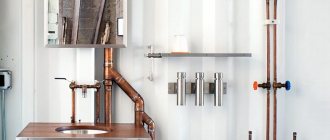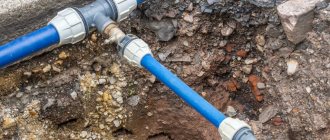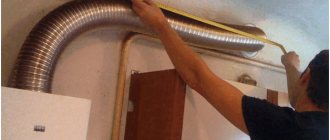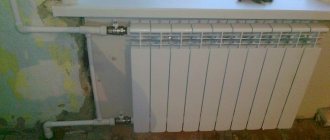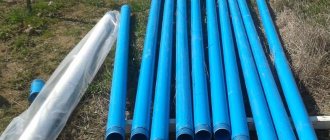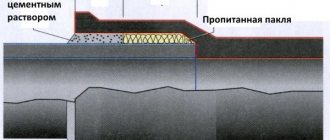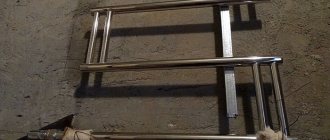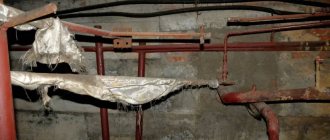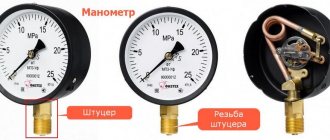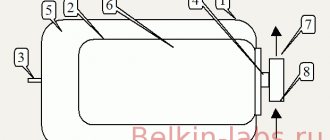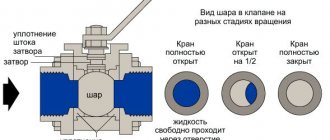A very unpleasant phenomenon, especially in the silence of the night, when the water supply makes sounds in every way: noise, knocking, whistling, etc.
There may be several reasons why water pipes in an apartment are humming. It is imperative to understand and fix the problem - some serious troubles (which can lead to a water pipe break) begin with sounds. And peace and quiet in the house is worth any effort!
Sanitary standards allow tap sounds up to 30 dB (comparable to a whisper or the ticking of a clock).
Problem pump
If the house has a pressure booster system and a pump is installed, this may be the cause. It can cause vibration in the common riser, which will be transmitted to each apartment. It’s not difficult to determine – just touch and listen to the pipes on the first floor.
Usually the pump is installed in basements or on the technical floor. To solve the problem, it is best to call a plumber or utility company. But it would be a good idea to check its operation.
Most often the reason is in the pump mounts. They become loose over time, and the resulting vibration is transmitted to the pipes. If there are gaskets where the pump and frame meet, they may lose elasticity or harden and fall apart. The solution to the problem is simple - install new gaskets.
Over time, any equipment wears out. An old pump may produce uneven pressure and operate intermittently. This causes turbulence in the water, causing the pipes to vibrate. In this case, there are two options: repairing the old pump, or installing a new one.
Causes of the problem
When searching for the source of extraneous sounds, pay attention to the nature of the noise. By combining several factors, it will be possible not only to determine the culprit, but also to choose the appropriate way to eliminate the problem. Let's look at the main reasons in detail.
Continuous hum
A monotonous noise background is typical for old buildings. An unpleasant sound often accompanies a breakdown of the main line, which is located in the basement. The pipes in such buildings were made of steel. Elements of metal structures are destroyed by corrosion over time, which provokes a problem. A monotonous, booming noise occurs when valves break due to worn-out shut-off valves.
The water pipe hums when the faucets with water outlets do not fit tightly. Loose couplings cause noise when they come into contact with line components. An unpleasant sound is caused by systems assembled with different diameters. A loud roar occurs as the liquid flows through.
How to identify the causes of noise Source septik27.ru
The problem of humming pipes is typical due to installation errors. If flanged valves in the basement are installed against the directional flow, an unpleasant sound will appear. Background noise occurs when individual segments of the system are loosely fixed to the floor or are close together.
Rumble with vibration
If the loud sound is accompanied by vibrations, then the cause of the problem is a faulty faucet. For axlebox models with rubber gaskets, the coating quickly wears out. The breakdown does not cover the flow of moisture and the steel valve, which leads to vibrations.
Pipes in the bathrooms of apartments located on the first floors of high-rise buildings often hum with vibration. The system is installed very close to the main line, and due to the high water pressure, a sharp sound occurs. If fluctuations in pressure occur when the faucet is opened, then there is a violation in the water line.
Taps and valves
Often water pipes hum when opening a tap or flushing water. This is due to the fact that it moves unevenly throughout the system. This means that there is an obstacle somewhere. Most often, such an obstacle is an old, worn-out valve.
Finding a faulty node is easy. To do this, you need to perform the following steps for each valve:
- Fully open the valve closest to the faucet or toilet;
- Flush the water or open the faucet;
- Gradually close the valve and listen to see if the sound level has changed;
- If no changes occur, move on to the next one, leaving this one completely open.
The valves cannot be repaired; the most that can be done is to change the gasket. But it is better to replace the faulty unit. Fortunately, a good ball valve is inexpensive.
Whistle and vibration
If the hum turns into a whistle, this indicates a deterioration in the permeability of the pipeline channels. What occurs due to blockage. Or the water flow valve is not completely closed.
This is especially true for old metal pipes, where lime accumulates and becomes clogged. Clean or replace the pipes or tighten the valve, and the problem will be eliminated.
Noise, which is accompanied by vibration, appears due to a malfunction of the faucet axleboxes, mixer, shut-off valves in the toilet cistern or sections of the water supply in neighboring apartments, as well as when the gasket is completely worn out. High water pressure sometimes also causes noise with vibration, which is typical for the first floors of high-rise buildings.
Why are the pipes knocking?
It happens that there is an extraneous knock in the water pipes. This is most likely due to the hot water pipes. They can make characteristic sounds during thermal expansion and contraction.
If you have not used hot water for a long time, the part of it that is in the pipe has time to cool down. In this case, the pipe decreases in size and characteristic clicks are heard at the junction with the wall and fasteners. The solution to the problem is simple - place rubber gaskets where the pipe comes into contact with something.
Sometimes the knocking noise is quite loud and can be heard whether you are using hot water or not. This indicates a malfunction of the screw valve in the common riser. You can determine the problem by ear - the closer you are to the valve, the louder the knocking in the pipe will be.
Knocking in water pipes may be associated with the installation of regulators, reducers, filters and other equipment. It can be directional (see photo). If it is installed incorrectly, extraneous noise will appear. The solution to the problem is simple - move the plumbing fixture in the right direction.
Directional water pressure regulator.
Extraneous sounds in the water supply
Most often, strange noises reach residents from the water supply system. Sounds can be caused by a variety of reasons: disturbances in centralized communications, incorrect connection of plumbing fixtures, defects in the design of the riser, and malfunction of mixers.
To correctly determine the source of the malfunction, you should first listen to the noise to determine where it is coming from and what it sounds like.
The most common sounds heard from water pipes are:
- monotonous hum;
- humming turning into whistling;
- intermittent knocking noise;
- a loud, sharp sound that may be accompanied by strong vibration when opening the tap.
Let us consider in detail the reasons causing these noises.
Constant hum in the pipes
The most annoying extraneous sound is the monotonous humming in water pipes. Most often, such noises are heard in “aged” buildings, which have been in operation for decades.
A constant hum can be caused by a variety of reasons.
Reason #1 . Defects of the centralized system. If the sound comes from the basement and then spreads throughout the house, it is caused by the central pipe.
This is a common problem due to the fact that Soviet-built buildings usually used communications made of steel, the service life of which had long expired.
Often the cause of extraneous sounds lies in the basement, where the general communications are located. In this case, only specialists who carefully examine the communications can cope with the problem
Under the influence of corrosion, metal elements sooner or later begin to collapse; cracks or fistulas form in them, from which water seeps out.
In this case, it is extremely difficult to eliminate the defect yourself; it is better to entrust the repair to professionals by contacting the Housing Office. As a rule, after repairs, unpleasant sounds disappear.
Reason #2 . Sometimes noise can occur in basement plumbing lines even when the pipes are in good condition. Their cause may be an open vent or an incompletely closed plug. Such problems are also easily corrected by specialized service workers.
Reason #3 . Extraneous sounds from the basement may be caused by pipe branches that are too close together. When areas that vibrate due to water pressure come into contact, a hum may occur that reaches the inhabitants of the apartments.
A simple and effective solution to this problem is to treat each of the pipes with high-quality foam insulation.
Reason #4 . Humming can be caused by the use of elements with different diameters in the pipeline. When connecting pipes of different sizes and adjusting them, the flow of water is disrupted, which causes extraneous noise.
In this case, it is better for the residents of the house to contact the housing office with a collective statement regarding the repair of the water supply or replacement of the riser.
The cause of unpleasant sounds may be a valve that does not completely shut off the water flow. To fix this problem, sometimes it is enough to simply tighten the tap. In more complex cases, it is necessary to replace the part
Reason #5 . Difference in diameters. If pipes of different sizes were used when laying the pipeline, with larger diameters being adjusted to smaller diameters, this disrupts the flow of water, which can cause noise.
Reason #6 . The same problem can be caused by a valve that is not fully open or old valves (faucets) that impede the normal flow of fluid. In this case, an area of high pressure appears, and the sounds produced by the turbulence of the water will be carried throughout all apartments related to the riser.
Reason number 7 . Sometimes monotonous noises are associated with a leaking faucet. The sound may occur due to a worn gasket that seals the mounting location of this device with a tee.
Due to the difference in pressure between the two pipes, a constant humming noise may occur. In this case, it is enough to repair the faucet yourself by replacing the gasket.
A common source of unpleasant noises is a leaking faucet. To rule out this reason, it is advisable to check the condition of the faucet in the bathroom and ask if your neighbors have any leaks
Reason number 8 . The hum may occur due to a leaking faucet in a neighboring apartment. This version may be a priority if noises are clearly heard at night, when water consumption is reduced to a minimum.
Humming turning to whistling
Sometimes a specific noise is heard in water supply lines, reminiscent of a whistle, which intensifies with increasing pressure. This sound usually occurs when individual parts of the system are insufficiently permeable.
This can be caused by two reasons:
- valve is completely or partially closed;
- pipe blockage.
To eliminate the first case, it is enough to check the position of the shut-off valve responsible for this section of the pipeline.
A hum that turns into a whistle most often indicates a clogged pipe. It often occurs due to the build-up of mineral salts
If the valve position is correct, you need to check the pipes for blockages. In an apartment, it is enough to disconnect the element from the mixer and clean it, if necessary, using a mechanical method or pneumatic or hydraulic flushing.
If you suspect a blockage in the centralized water supply system, you must call a specialist who will find the defect and make repairs.
Tapping in water pipes
Sometimes strange knocking noises can be clearly heard in the water supply system located in the apartment. The causes of these noises can be varied.
Reason #1 . Thermal expansion of pipeline parts. This problem especially often worries owners of apartments equipped with steel water pipes. The reason for this is due to the special properties of the metal. If hot water begins to flow into a very cool pipe, the steel walls begin to heat up, and this causes them to expand.
The increase in size is difficult to assess visually, but often it is enough for closely located parts to begin to touch each other, and their contact is accompanied by a knock.
To eliminate this problem, it is advisable to use plastic pipelines. Metal parts can be wrapped in polyethylene foam or other reliable insulation.
Sometimes, to get rid of unpleasant sounds in the water supply, it is enough to fix the pipes on the wall using special fasteners
Reason #2 . Sounds where the pipe is fixed to the wall. A similar problem can be caused if, due to thermal expansion, the pipes begin to hit the fasteners in the wall. This can be found out by localizing the location of the noise.
To fix the problem, it is recommended to use additional fasteners, such as staples, to secure the structure. If there are noises from the riser, they can be eliminated by filling the void in the ceiling with high-quality polyurethane foam.
Reason #3 . There are also errors when installing the valve. If the screw element is not installed correctly, the valve may come off. A part that gets into the pipe cavity will hit its inner surface, blocking the water flow. This problem must be solved immediately by calling a specialist.
Reason #4 . Sometimes air gets into the pipes. The cause of tapping may be air pockets in the pipelines. The most effective way to eliminate them is to install an air exhaust system. It will also protect structural elements from corrosion and eliminate malfunctions during pump operation.
Image gallery
Photo from
Using a hydraulic tank to stabilize pressure
Valves for bleeding air from the system
Using a storage tank in a private water supply
Release of excess air along with water
Noise in pipes with vibration
Sometimes when you open a tap, you hear a loud humming sound, which is usually accompanied by pronounced vibration.
To reliably protect yourself from problems with the mixer, which can cause extraneous noise, it is better to give preference to models with reliable faucet axle boxes made of ceramic or brass
The most common cause of such a malfunction is problems with the faucet axle, an important part of the mixer. If water pressure increases, this element blocks the pressure, creating flow turbulence, which causes a hum.
To diagnose such noise, it is enough to open the hot/cold water supply valves one by one to find out where the problem lies.
Most often, sounds occur in faucets that use rubber gaskets. It is better to replace such models with reliable analogues with ceramic valve axle boxes - in this case, the gaskets are part of the design of the device.
As a rule, the operation of such devices is absolutely silent; the occurrence of extraneous sounds indicates incorrect assembly.
The cause of sudden strong noises in water supply communications, which disappear just as quickly, may be a malfunction of pipes in a neighboring apartment. In this case, you should talk to its owners.
A humming sound in pipes when the tap is open can also be caused by excess pressure formed in the pressure system. Typically, this problem occurs at certain times of the day (peak hours), when the water pressure in the pipes reaches its maximum value.
This phenomenon is quite dangerous, since it is not limited to the occurrence of unpleasant sounds. Increased impact on the system can lead to a violation of the integrity of the structure, causing a violation of the tightness of the fasteners.
The appearance of extraneous sounds is sometimes caused by insufficiently tight connections of pipes, mixers and other instruments. All parts must be tightly tightened
If the owners of an apartment with newly installed plumbing complain about humming and vibration of the taps, first of all it is necessary to check how correctly the connections of the faucets and pipes were made. It is important to seal all existing fasteners, after which extraneous noise usually disappears.
To reduce high pressure, it is advisable to place an air chamber between the taps and pipes, making it using a special muffler or an additional piece of pipe.
A humming sound can also occur in the toilet cistern, in which case the reason lies in the shut-off valve - a membrane or valve. To fix it, you need to turn off the water and then replace the existing rubber gasket with a harder one. A washer installed under the membrane will also help eliminate sounds.
Cold and hot water
It happens that the pipes start humming as soon as you open the tap. This happens when there is a large pressure difference in the pipes. The flow of hot and cold water meets in the mixer, the pressure tries to equalize. At the same time, in a pipe with less pressure it increases.
Because of this, turbulence occurs in the flow, and the pipe begins to vibrate. Sometimes the sound disappears after a few seconds. But it happens that the pipes hum throughout the entire time the tap is open. In this case, the mixer may noticeably tremble and shake.
The problem can be solved by installing a pressure regulator or reducer. The only thing you need is to find out which pipe has more pressure. You need to install a regulator on it.
High internal pressure
The pressure force can be easily determined by the water pressure. If you quickly open the taps, the pipes will hum when there is excess pressure. Excessively high pressure will eventually lead to rupture of pipe connections, and as a result, to depressurization of the water supply system.
To reduce the load on the pipeline and eliminate noise, install a faucet with an air chamber at the connection point, which will absorb excess water pressure.
You can make such a camera yourself. To do this, take an additional piece of pipe or a special factory muffler. Thus, the load on the pipeline will be significantly reduced and it will last much longer.
If you are not sure that you can do everything yourself, then seek qualified help. In addition, if the water pressure is excessive due to air impurities in it, then you will not be able to cope with the problem on your own.
The normal water pressure with pressure in the mixer is 2 atm. In this case, the dishwasher and washing machine will work fully. The limiting limit can be considered a pressure value of 6 atm.
True story
In one small town, utility workers decided to save on water consumers. In several houses where there was a common meter, they pulled off the following fraud.
The plumber, under the guise of repairs, cut off the supply of cold and hot water. After that, he inserted coins of a suitable diameter into the pipes. A hole was drilled in them - in this way he narrowed the diameter of the pipes and the water pressure.
The scheme is simple - the meter showed that the required volume was consumed. But in reality, people used less water than shown. The utility workers pocketed the difference.
Due to the narrowing of the diameter, the water pipes began to hum. The residents of one house turned out to be conscious and called an independent specialist. It turned out to be a good-level master and was able to determine the reason. The scam came to light
Warm neighbor's floor
Often the cause of humming in pipes is neighbors who have installed heated floors. They are usually connected to a central heating system and can cause noise in the radiators. But some people connect them to a hot water supply system.
If the pump is selected incorrectly, it can pump water under high pressure. Because of this, the effect of cavitation occurs - the formation and collapse of air bubbles. This process causes the corresponding sound. Its tone can vary from a low hum to a whistle.
Cavitation is the process of formation and subsequent collapse of vacuum bubbles in a liquid flow, accompanied by noise and hydraulic shocks, the formation of cavities in the liquid (cavitation bubbles, or voids), which may contain rarefied vapor.
Wikipedia
In this case, the problem can only be solved by talking with your neighbors. They will need to reduce the rate of water pumping through the heated floor. This can be done either by adjusting the pump or the valves on the manifold. With their help you can also determine which circuit is noisy.
Evening roulades
Sometimes the pipes begin to hum in the evenings, usually from 6 to 9 pm. The reason suggests itself - residents return home from work and start using water at the same time.
As a rule, this happens in houses where the diameter of the common riser is incorrectly calculated. If it is not designed for maximum water intake, it will flow too quickly during peak hours. There is only one way out - to change the riser completely.
But there may be another problem. In old houses, dirt and silt are deposited on the walls of the riser. Accordingly, its diameter decreases. If the humming in the pipes appeared not so long ago, this may be the reason. Now is the time to call the utility workers.
Contamination on the common riser pipe after 10 years of use.
Briefly about the main thing
Humming in water pipes can be divided into two categories. Those that occur in highways and risers. And which happen within the apartment itself. In the first case, either management companies or building management are responsible for the problems. And they can be solved with the help of professional plumbers.
If the problem is with taps or mixers, then the breakdown can be repaired yourself. But when you lack confidence in your abilities, it is better to call a specialist. Such repairs are not a global problem and will be relatively inexpensive.
Read later
We will send the material by email
Pipes and walls
In old houses, where pipes have not been replaced for decades, extraneous noise often appears. In places where the water supply enters an apartment or bathroom, a small gap forms between the pipe and the wall. Therefore, the pipe is able to vibrate.
The water main can be partially recessed into the wall. If you have this option, inspect part of the wall along the pipe. If a crack is visible, it means the pipe is not holding tightly and is vibrating.
In this case, it is not difficult to correct the situation. Clean the old mortar along the entire length of the pipe. Instead, fill the resulting space with alabaster.
Sometimes the pipes are located in metal holders, clamps or brackets. Over time, they weaken and give the pipes room to vibrate. There are three ways to resolve the issue:
- Replace holders or brackets;
- Tighten the fasteners;
- Place rubber gaskets between the holders and the pipe.
It's time to clean the pipes
The quality of tap water leaves much to be desired. Therefore, over time, dirt accumulates on the walls of the pipes. The system silts up and the working diameter narrows. For this reason, two effects may occur.
If the pipes become clogged more or less evenly, water under pressure begins to flow through them faster. Since the surface of the pipes is not smooth, turbulence occurs. They cause vibration and water pipes begin to hum.
Sometimes a pipe becomes clogged in one place faster than along its entire length. This usually happens at bends. Such blockages act on the principle of a whistle - the flow of water accelerates for a short period of time and causes vibration. Accordingly, extraneous sound appears.
There are three ways to solve the problem:
- Replace old water pipes;
- Clean the line using special chemicals;
- Clean deposits mechanically.
What to do if water boils in the batteries
You can often hear sounds such as gurgling water, even intense seething. As a rule, this is due to the presence of so-called air locks. They are looking for a way out - as a result of which the water in the system can boil. Moreover, this not only leads to discomfort, but also to the fact that the efficiency of the coolant decreases, since, as is known, the thermal conductivity of air is worse than that of water. In order to eliminate air pockets, special taps are often installed at the upper levels of the heating system, through which excess air is released.
Mayevsky tap is a device for releasing air from central water heating radiators, opened using a special key or screwdriver.
Leaks and breaks
Often water pipes leak for years, but no one realizes it. Most often, leaks occur in the basement, where the condition of the water supply system is not monitored. Water comes out through microcracks under pressure and an extraneous sound appears.
If there is a leak in the basement, it can be identified by a humming, hissing, or whistling sound. The sound will increase from the upper floors to the lower ones. The closer to the accident site, the louder it is.
For noise to appear in the pipes, the water does not need to flow like a fountain. Under certain circumstances, a quiet sound will resonate in the system. And it spreads very well along a steel highway.
Types of noise
An irritating sound in the water supply is not normal. Noises in a structure are conventionally divided according to characteristics that are characteristic of various breakdowns. A whistle in the system occurs when the mixer is turned on and is associated with an increase in pressure or poor patency of the channels.
The problem of humming pipes occurs when there is vibration in the pipeline. An unpleasant sound often begins after poor-quality installation when:
- weak fixation to the floor or partitions;
- poor connection of fittings;
- touching the links of the system.
Two trumpets sound in unison
Sometimes installers of plumbing systems reach the point of absurdity. There have been cases when pipes with cold and hot water were placed so that they touched each other. In addition to the fact that hot water was cooled and cold water was heated, there was another effect.
Pipes carrying water may vibrate unnoticed by the eye. This usually happens silently. There are many reasons for small vibrations. But if two such pipes come into contact, an extraneous sound may appear.
The solution to the problem is simple - lay a strip of soft material between the pipes along their entire length. It is best to use thermal insulation, but regular rubber will do. It will prevent the pipes from resonating and prevent sound.
Noise in pipelines is a discomfort
Residents of multi-storey buildings often encounter sounds (knocking, humming, whistling) that can be heard in various communication systems: plumbing, heating, sewerage.
Sometimes such noises are periodic in nature, in other cases they sound constantly, causing a lot of inconvenience to apartment residents.
Extraneous sounds in communications make life difficult. It is better to find out the cause of their appearance as early as possible and eliminate the noise.
It is important to know that buzzing and other sounds are not only unpleasant, but can also indicate serious problems in life support systems. Try to take immediate action by understanding the causes of the noise, without waiting for it to go away on its own.
Wider doesn't mean better
It happens that water pipes hum in a new house, or immediately after they have been replaced. The reason for this is an incorrectly designed water supply system. Or rather, inappropriate pipe diameters.
If pipes of different diameters are installed on the same main line, the water swirls at the junctions. Uneven pressure occurs, cavitation effect occurs and extraneous sound appears. This may be a humming, hissing or whistling sound.
Unfortunately, in this case, you can’t get by with a little bloodshed.
We will have to review the entire system and, most likely, replace pipes with a narrowed diameter with standard ones.
Poor quality repairs
If a hum is heard when you turn on the tap several times a day, then it is very likely that someone in the neighborhood recently repaired the water supply. It is very possible that plumbing repair specialists replaced pipes in the basement. There was some mistake in their work. For example, connections are not made securely. In this case, it is very easy to level out the unpleasant buzzing. For this purpose, all installation errors are eliminated.
Another reason for noise from water pipes is that the pipes are installed close to each other. The thing is that when water passes through a pipeline, vibration is created, as a result of which the pipes, in contact with each other, hum. To eliminate noise, simply wrap each pipe in foam insulation.
